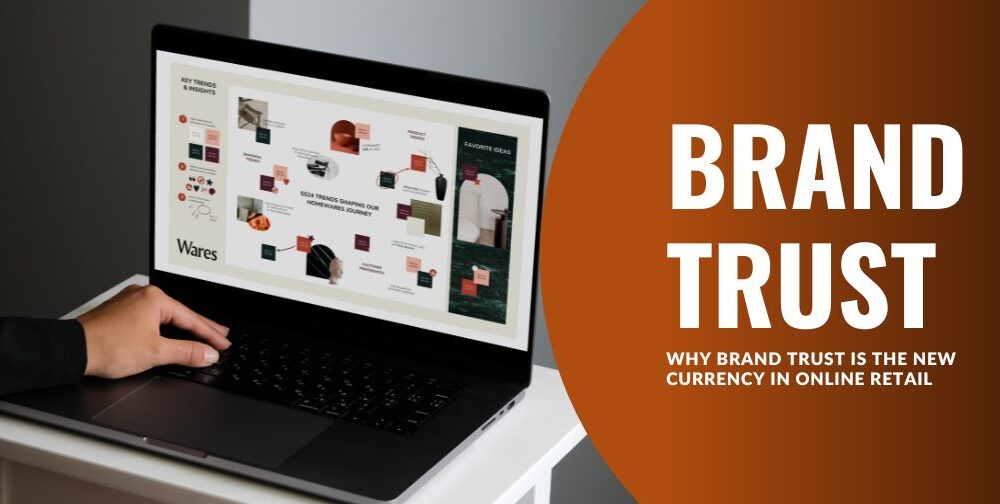Why Brand Trust Is the New Currency in Online Retail

In today’s digital economy, trust isn’t optional—it’s everything. While catchy ads and clever branding might get a customer’s attention, it’s authenticity, transparency, and follow-through that keep them coming back. In an age where misinformation runs rampant and fake reviews are more common than pop-ups, brand trust has become the new currency of online retail—and consumers are holding brands accountable like never before.
Welcome to the Era of Skeptical Shoppers
Consumers today are tech-savvy, review-savvy, and scam-wary. According to a 2024 study by Edelman, 71% of shoppers say they won’t buy from a brand unless they trust it, and 81% research products online before clicking “buy now.” The days of blindly buying from a sleek website with flashy graphics are long gone.
Buyers now zoom in on the fine print, scan review sections for red flags, and scroll deep into Reddit threads for unfiltered opinions. They check lab reports, hunt for ingredients they can pronounce, and—most importantly—expect total honesty from the brands they support.
And if they don’t find it? They bounce—fast. Or worse: they talk. With social media acting as a global megaphone, one customer’s negative experience can become tomorrow’s viral warning post. In that environment, authenticity becomes your best insurance policy.
Trust Is the Tech Retail Advantage You Can’t Ignore
In a digital marketplace where artificial intelligence and counterfeit products are just a click away; online retailers are increasingly leaning into transparency as a tech-enabled competitive advantage.
From blockchain-verified supply chains to real-time customer service chatbots, brands are investing in technologies that help them prove their legitimacy at every customer touchpoint. But it’s not just about software—it’s about culture. It’s about being real.
Case Study: How One Brand Builds Trust from the Ground Up
Take Simple Leaf, a wellness company that understands trust isn’t just something you earn once—it’s something you have to earn every single day.
“Trust is earned through every click, every label, every response. We built Simple Leaf to be radically transparent,” says the company’s co-founder and CEO, Brandon Rowe. “From day one, we decided no gimmicks—just clean ingredients, third-party lab testing, fast shipping and honest conversations with our customers.”
Simple Leaf’s website reflects that mission: lab reports are posted front and center, every product page includes detailed sourcing information, and the company has hundreds of verified reviews from real customers. They even include negative feedback when it helps educate future buyers. That is how you build trust that lasts.
They’ve also adopted customer-centric tech—like loyalty programs, quick reordering tools, and educational content—that keeps buyers informed, not just sold to. That transparency doesn’t just build credibility—it creates community.
Transparency > Perfection
Ironically, the most trusted brands aren’t perfect—they’re human. Customers are far more likely to trust a brand that admits when it made a mistake and owns the resolution, than one that pretends everything is always flawless. In fact, studies show that brands with a few 3- and 4-star reviews actually convert better than brands with nothing but 5-star praise (which often looks fake).
In an oversaturated market, honesty has become a differentiator.
More than ever, customers are craving honesty over hype, and relatability over rigid corporate polish. When brands open up about their process, their wins, and even their growing pains, customers respond not just with purchases—but with loyalty.
Tips for Building Brand Trust in a Digital-First World
If you’re running an e-commerce business—or thinking of starting one—here’s what today’s shoppers are looking for:
- Visible proof: Lab results, customer testimonials, verified reviews.
- Clear communication: Real-time responses, transparent shipping, no bait-and-switch tactics.
- Consistency: Deliver what you promise, every single time.
- Ownership: Admit mistakes. Fix them fast. Follow up with empathy.
- Authenticity: Don’t talk like a brand. Talk like a human.
Final Thoughts: Trust Is a Long Game
In a world where consumers can swipe away in seconds, earning loyalty takes more than clever copy or one-time coupons. It takes substance. The brands thriving in 2025 are the ones who invest in long-term relationships, not short-term gains.
And here’s the truth: people don’t just buy products anymore—they buy values. If your business can demonstrate integrity, consistency, and a genuine commitment to your customers, then you’re not just building a brand.
You’re building trust—and that’s the most valuable asset in modern commerce.

Source: Why Brand Trust Is the New Currency in Online Retail

